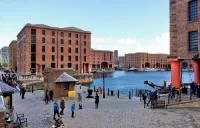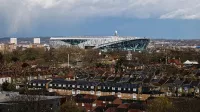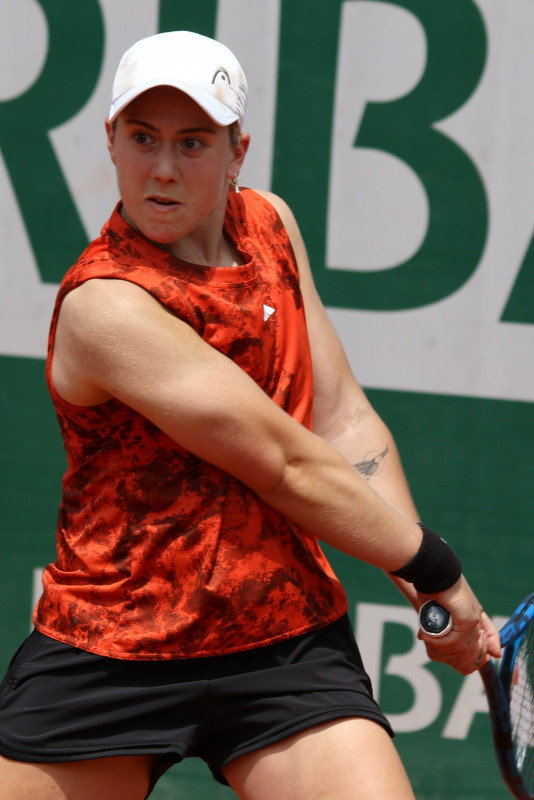The English Football League Cup, also known as the Carabao Cup due to sponsorship, is an annual knockout tournament in English men's football. It is open to all clubs within the English Football League and Premier League, offering clubs another opportunity to win a domestic trophy. The competition often sees Premier League teams entering at a later stage, while lower-league clubs have the chance to progress and face top-tier opponents. Winning the League Cup guarantees a place in European competitions, specifically the UEFA Europa Conference League, adding significance to the competition.
May 1960: Criticism from The Times
On 30 May 1960, The Times criticized the Football League Cup's introduction as adding to existing problems and not benefiting players, clubs, or the public.
1960: First held as the Football League Cup
In 1960, the Football League Cup was first held to respond to the increasing popularity of European football and to exert power over the FA.
1960: Aston Villa wins inaugural League Cup
In 1960-61, Aston Villa won the inaugural League Cup, defeating Rotherham United 3–2 in the final over two legs.
1960: First League Cup
In 1960–61, Aston Villa won the first League Cup, marking their status as the holders of the overall record for major trophies won in England at the time.
1960: League Cup Introduced
In the 1960–61 season, the League Cup was introduced as a mid-week floodlit tournament to replace the Southern Professional Floodlit Cup.
1961: Two-Legged Final
From 1961 to 1966, the League Cup final was two-legged.
1961: League Cup Structure
In 1961, the League Cup structure was such that all teams were involved from the second round, with some receiving byes.
1961: Bradford City eliminates Premier League sides
In the 1961–62 competition, Rochdale eliminates Premier League sides.
1966: European Football Qualification
From 1966–67, EFL Cup winners started receiving a place in the Inter-Cities Fairs Cup, allowing qualification for European football.
1966: UEFA Qualification for League Cup winners
In 1966, UEFA provided the League Cup winner with a place in the European competitions, providing the team was in the first division.
1966: Queen's Park Rangers win
In the 1966–67 final, Division Three side Queens Park Rangers came from 2–0 down at half time to win 3–2 against top-flight West Bromwich Albion.
1966: Two-Legged Final
The League Cup final was two-legged until 1966.
March 1967: First League Cup Final at Wembley
On 4 March 1967, the first League Cup final was held at Wembley Stadium, where Third Division Queens Park Rangers defeated First Division West Bromwich Albion.
1967: Single Match Final
Since 1967, the League Cup final has been played as a single match at Wembley Stadium.
1968: Swindon Town win
In 1968–69, Third Division side Swindon Town beat Arsenal 3–1 after extra time in the final to win the trophy.
1968: Manchester United declines to participate
In the 1968–69 season, only Manchester United declined to participate in the League Cup.
1968: Death of Richards
Richards, who foresaw the League Cup final being held at Wembley, died in 1968.
1968: Queen's Park Rangers did not participate in Europe
The winners of the 1968–69 edition, Swindon Town did not participate in Europe, as they were not in the First Division.
1970: Everton chose not to compete
In 1970–71, Everton chose not to compete so that they could concentrate their efforts on the European Cup.
1972: Switch to UEFA Cup
From 1972–1973, the winners of the EFL Cup received a place in the UEFA Cup, now known as the UEFA Europa League.
1974: Chester beats Leeds United
In 1974–75, Fourth Division side Chester beat defending league champions Leeds United 3–0 during their surprise run to the semi-finals.
1974: Two-Legged Tie Replays
Until 1974-75, two-legged ties level after extra time in the second leg were replayed; three ties reached a third replay.
1975: Penalty Shoot-Outs Introduced for Replays
Between 1975-76 and 1979-80, ties were still replayed, but a penalty shoot-out settled ties after a replay.
1975: First Round Format
From 1975-76, the first round was two-legged until 2000-01.
1977: Only Final to Require Two Replays
In 1977, the League Cup final between Aston Villa and Everton was the only final to require two replays.
1979: Penalty Shoot-Outs Introduced for Replays
Between 1975-76 and 1979-80, ties were still replayed, but a penalty shoot-out settled ties after a replay.
1979: Second Round Format
From 1979-80, the second round was two-legged until 2000-01.
1980: Replays Abolished
In 1980-81, replays of two-legged matches were abolished, with the away goals rule and penalties adopted instead.
1980: Current Trophy
The current trophy of the Football League Cup was used until the 1980-81 competition.
1981: Title Sponsorship
From 1981 to the present (except in 2016-17), the League Cup has attracted title sponsorship, being named after its sponsor.
1981: Sponsor's Trophy
In 1981-82, the Milk Marketing Board, the first competition sponsor, chose to award its own trophy from 1981-82 to 1985-86.
1983: Liverpool completes treble
Liverpool completed a treble of trophy wins in 1983–84, winning the League Cup as part of it.
1985: English clubs banned from European competitions
In 1985, English clubs lost their places in European competitions due to the Heysel disaster; Norwich City, the League Cup winners, missed out on European competition.
1985: Sponsor's Trophy
In 1985-86, the Milk Marketing Board, the first competition sponsor, chose to award its own trophy from 1981-82 to 1985-86.
1986: Sponsor's Trophy
In 1986-87, Littlewoods also chose to award their own trophy, from 1986-87 until 1989-90.
1986: Semi-Final Replays Abolished
Until 1986-87, level semi-final ties were replayed, after which the away goals rule and penalties were introduced.
October 1989: Scarborough defeats Chelsea
In October 1989, Scarborough, then a former League club, defeated Chelsea 4–3 on aggregate.
1989: Sponsor's Trophy
In 1989-90, Littlewoods also chose to award their own trophy, from 1986-87 until 1989-90.
1990: Ban lifted, winners did not participate
Even when the ban was lifted in 1990, League Cup winners did not participate in European competitions for two more years.
1990: Current Trophy
The current trophy of the Football League Cup was used again since the 1990-91 competition.
1992: Scarborough defeats Coventry City
In 1992–93, Scarborough defeated Coventry City 3–2 on aggregate, before narrowly losing to Arsenal.
1993: Penalties Introduced
In 1993-94, penalties were introduced to settle the first replay.
1995: York City defeats Manchester United
In 1995–96, York City beat Manchester United 3–0 at home in the second round, first leg, ultimately winning 4-3 on aggregate.
1995: League Cup Structure
Until 1995, all teams were involved from the second round, though some received byes.
1996: Last Replay
In 1996-97, the last single-legged tie to require a replay was played.
1996: League Cup Structure Change
Since 1996, teams involved in European competition receive a bye to the third round, while remaining Premier League teams enter at the second round.
1997: Final Replays
Between 1967 and 1997, League Cup finals that finished level after extra time were replayed at an alternative venue until a winner was decided.
1997: Grimsby Town defeats Premier League sides
In 1997–98, Grimsby Town defeated Sheffield Wednesday 4–3 on aggregate and Leicester City 3–1.
1998: Penalty Shoot-Outs Introduced for Finals
Since 1998, League Cup finals that have finished level after extra time have been decided by penalty shoot-out.
1999: Final Timing
Until 1999-2000, the League Cup final was played in late March or early April.
2000: Final Timing Change
From 2000-01, the League Cup final has been played in late February or early March.
2000: First and Second Round Format
In 2000-01, the first and second rounds were two-legged until this year.
2000: Liverpool completes treble
Liverpool completed a treble of trophy wins in 2000–01, winning the League Cup as part of it.
2001: Premier League clubs dominate the competition
Between 2001 and 2024 Premier League giants Manchester City, Manchester United, Liverpool and Chelsea won 19 editions of the tournament.
2001: Final Venue Change
In 2001, the Millennium Stadium in Cardiff was used for the final between 2001 and 2007, following the demolition of the old Wembley.
2001: Grimsby Town defeats Liverpool
In 2001–02, Grimsby Town beat Liverpool 2–1 in extra time at Anfield.
2002: Preliminary Round
In 2002-03, a preliminary round was necessary for the League Cup.
2006: Manchester United knocked out by Southend
In 2006–07, Manchester United were knocked out by Southend United.
2007: Final Venue
In 2007, the Millennium Stadium in Cardiff was used for the final between 2001 and 2007, following the demolition of the old Wembley.
2007: Manchester United knocked out by Coventry City
In 2007–08, Manchester United were knocked out by Coventry City.
2010: Ferguson Described the trophy as worth winning
In 2010, Alex Ferguson described the League Cup trophy as worth winning, in response to Arsène Wenger's claim that a League Cup win would not end his trophy drought
2011: Carling ends League Cup Sponsorship
In 2011, Carling opted out of renewing its sponsorship of the League Cup because of the lack of prestige it attracted.
2011: Preliminary Round
In 2011-12, a preliminary round was necessary for the League Cup.
2012: Bradford City eliminates Premier League sides
In the 2012–13 competition, League Two side Bradford City eliminated three Premier League sides.
February 2013: Swansea City wins League Cup
On 24 February 2013, Swansea City beat Bradford City 5–0 to win their first major English trophy.
2014: Manchester United lost to MK Dons
In the 2014–15 season, Manchester United lost 4–0 against third-tier side MK Dons.
2016: Rebranding as EFL Cup
In 2016, with the renaming of the Football League as the English Football League, the tournament was rebranded as the EFL Cup from the 2016–17 season onwards.
2016: Title Sponsorship
In 2016-17, the League Cup was not named after a sponsor.
2016: Competition Renamed the EFL Cup
In the 2016–17 season, the competition was renamed the EFL Cup as part of the Football League's rebranding to become the English Football League.
2018: Extra Time Scrapped
From 2018-19, extra time was scrapped for all rounds except the final, and the away goal rule was scrapped for the semi-final, with level ties going straight to a penalty shoot-out.
2019: End of UEFA Europa League Qualification
The 2019-20 season marked the end of EFL Cup winners qualifying for the UEFA Europa League.
2020: UEFA Conference League Qualification
From the 2020–21 season, the EFL Cup winners instead qualified for the UEFA Conference League.
2022: ITV Sport Highlights
Beginning in 2022/23, highlights from several matches on ITV Sport will be available.
2024: Premier League clubs dominate the competition
Between 2001 and 2024 Premier League giants Manchester City, Manchester United, Liverpool and Chelsea won 19 editions of the tournament.
2024: Sky Sports and ITV Broadcasting
From 2024/25, all matches will be broadcast live by Sky Sports, with ITV showing both semi finals and the final live, sharing coverage with Sky Sports.
2024: VAR System Introduced
Since 2024-25, the Video Assistant Referee (VAR) system is used in all EFL Cup ties held at Premier League stadiums.
2025: Sky Sports Broadcasting
From 2025/26, Sky Sports will broadcast the EFL Cup on Sky Sports+ and Sky Sports Football.
2025: Newcastle United wins the EFL Cup
In 2025, Newcastle United defeated Liverpool in the final to claim their first EFL Cup title.
2025: Preliminary Round
In 2025-26, a preliminary round was necessary for the League Cup.
2025: Grimsby Town defeats Manchester United
In the 2025–2026 season, Grimsby Town defeated Manchester United 12-11 in a penalty shootout, after a 2–2 draw at home.
2025: As of 2025
Information regarding the EFL Cup as of 2025.
2026: Grimsby Town defeats Manchester United
In the 2025–2026 season, Grimsby Town defeated Manchester United 12-11 in a penalty shootout, after a 2–2 draw at home.
Mentioned in this timeline

Liverpool is a port city and metropolitan borough located in...

Football is a family of team sports primarily involving kicking...
France officially the French Republic is primarily located in Western...

Tottenham is a district in north London part of the...
England a constituent country of the United Kingdom occupies roughly...

Sport encompasses physical activities and games frequently competitive and structured...
Trending

2 months ago Alycia Parks vs Tamara Korpatsch in Angers: Preview, Prediction, and Betting Tips
11 months ago CME & Google Cloud Pilot Blockchain for Trading & Asset Tokenization Solutions
3 months ago AMD's Data Center Growth Boosts Optimism, Trillion-Dollar Market Cap Predicted, Analyst Cautions.
4 months ago Johor Regent Seeks Sale of $2.7 Billion Singapore Land Near Botanic Gardens
3 months ago Yen's Record Low Sparks Intervention Debate Amidst Japan's Cautious Rate Hike Approach.

4 months ago Sonay Kartal Advances to Beijing Round 3, Defeating Kasatkina Again
Popular

Kid Rock born Robert James Ritchie is an American musician...

Melania Trump a Slovenian-American former model has served as First...

XXXTentacion born Jahseh Dwayne Ricardo Onfroy was a controversial yet...

Thomas Douglas Homan is an American law enforcement officer who...
The Winter Olympic Games a major international multi-sport event held...

Instagram is a photo and video-sharing social networking service owned...